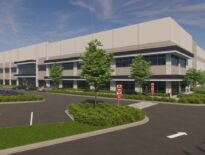
Boston Mayor Michelle Wu speaks to reporters outside City Hall on Nov. 17, 2021. Photo by John Wilcox | Boston Mayor's Office
Boston Mayor Michelle Wu acted swiftly on her first day in office to begin fulfilling one of her most famous campaign pledges by asking the City Council for $8 million to make three key bus routes serving Mattapan, Dorchester and Roxbury free for two years.
The money would come from the city’s allocation of federal pandemic relief money, which was initially distributed in 2020 when cities and states nationwide faced a fiscal cliff as large parts of the economy shut down. The feared collapse of tax revenues never materialized, leaving Boston and Massachusetts with a large pot of funds outside the normal city budget.
Wu’s proposal would pay for all fares on the Route 23 bus, which connects the Ashmont MBTA station to Nubian Square and the Ruggles station on the MBTA’s Orange Line via Grove Hall, the Route 28 bus, which connects Mattapan Square to Nubian Square and Ruggles via Blue Hill Avenue, and the Route 29 bus, which connects Mattapan Square to the Jackson Square Orange Line stop. The 29 bus also passes through the new, landmark bus lanes on Jamaica Plain’s Columbus Avenue.
“I am excited to take this key step towards a brighter transit future. Building on the fare-free 28 bus pilot created by Mayor Janey, we will expand access to transit across our neighborhoods, connecting more people to their schools, places of worship, small businesses, and community centers––and easing congestion on our bus riders and drivers alike. With stronger ties between our communities, we’ll reshape the boundaries of what’s possible in our city,” Wu said in a statement.
The proposal builds on a four-month fare-free pilot on the 28 bus launched by former Mayor Kim Janey. The pilot has been credited with boosting ridership on the line to 92 percent of its pre-pandemic level even as the MBTA’s overall bus and subway ridership continues to be a little over half its pre-COVID norm.
The three routes in Wu’s proposal are also some of the busiest in the MBTA system and provide the transit backbone for several mostly working-class neighborhoods of color.
Wu’s office said the pilot would also be an experiment to measure the benefits of fare-free bus service, which could include speeding up service by removing the need to pay on-board the bus and increasing ridership at a time when carbon emissions from cars are being increasingly seen as a priority target in the battle against climate change.
Wu’s proposal may take some time to come to fruition, however. Because of city budget rules, it required unanimous approval from the City Council. District 4 Councilor Andrea Campbell, who Wu beat in the September mayoral primary, opposed the measure according to GBH news, saying the council should first hold a hearing on the idea and take public comment.
Gov. Charlie Baker indicated he and Wu were already in discussions on transit topics, including a fare-free MBTA. It’s an idea that Baker previously said would be “worth the conversation,” though he has shown some resistance to the measure.
“I think there are a lot of things in public transportation that we can find common ground on, we actually talked about a bunch of those things,” Baker told reporters after the governor and the mayor had their first official meeting following Wu’s innauguration.
Chris Van Buskirk of the State House News Service contributed reporting.






